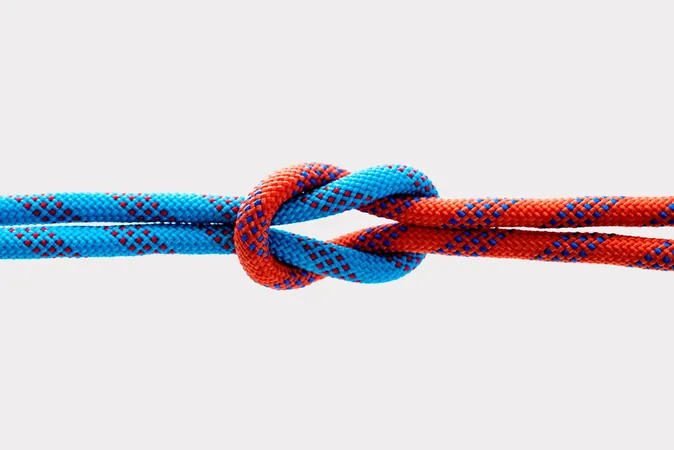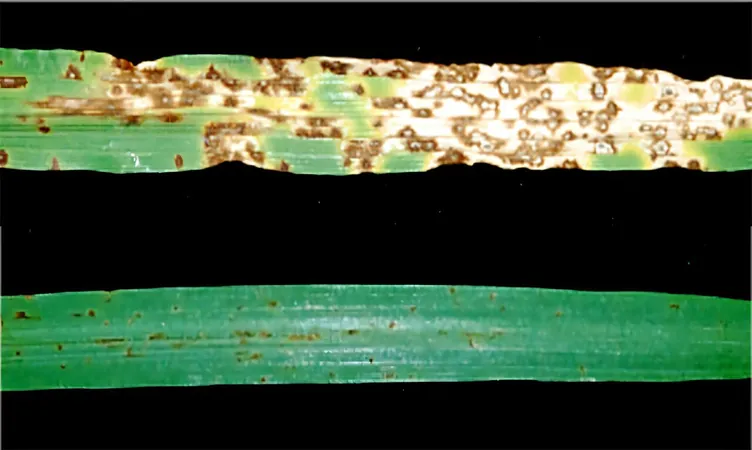
Are You Knotting It Right? Shocking Study Reveals Our Surprising Blindspot!
2024-12-09
Author: Jacob
Introduction
In a surprising twist that might leave you rethinking your knot-tying skills, recent research from Johns Hopkins University exposes the startling truth: despite our everyday interactions with knots, from shoelaces to neckties, most people are utterly lost when it comes to judging a knot's strength just by looking at it.
The Study
In an unconventional study, researchers presented participants with images and videos of various knots, challenging them to identify the strongest one. The results? A resounding failure. Even when provided with detailed diagrams depicting the knots' construction, participants struggled to make accurate judgments.
Expert Insight
Chaz Firestone, a co-author of the study and an associate professor in Psychological and Brain Sciences, expressed his surprise at humanity's lack of proficiency in this area. 'People are terrible at this. Knots are not that complicated—just strings tangled up. Yet, people can’t seem to assess how they will perform functionally,' he remarked.
Inspiration Behind the Research
This groundbreaking research, published in the cognitive science journal Open Mind, was inspired by Sholei Croom, a PhD student and avid embroiderer. While grappling with a complex knot of embroidery floss, Croom experienced firsthand the difficulties in understanding knots, despite her background in intuitive physics. She theorized that knots might present an often-overlooked challenge in our reasoning abilities.
Participants and Findings
Participants were challenged with four different knots that ranged from the incredibly strong reef knot to the notoriously unreliable grief knot, which can come undone with the slightest push. What researchers found was alarming; people could not consistently identify the stronger knot, often resorting to irrelevant cues that had nothing to do with strength.
Psychological Implications
Croom noted, 'Our psychological system simply fails to provide us with physical knowledge about knots. You can predict the stability of a stack of books or estimate how many bowling pins a ball will knock down without touching them, but knots seem to perplex our judgment.'
Questions Raised
The study raises intriguing questions: How does experience affect our ability to assess objects that lack rigidity, like string? While the average person's performance was disappointing, Croom speculated that individuals with specialized knowledge, like sailors or survivalists, might fare better due to their reliance on knot strength in real-life scenarios.
Conclusion
This research serves not only as a fascinating insight into human cognition but also opens up numerous questions about our physical reasoning capabilities. As we continue to navigate a world filled with knots—both literal and metaphorical—our inability to adequately judge their strength may leave us in precarious positions. So, are you still confident in your knot-tying abilities? It might be time to rethink your approach!









 Brasil (PT)
Brasil (PT)
 Canada (EN)
Canada (EN)
 Chile (ES)
Chile (ES)
 España (ES)
España (ES)
 France (FR)
France (FR)
 Hong Kong (EN)
Hong Kong (EN)
 Italia (IT)
Italia (IT)
 日本 (JA)
日本 (JA)
 Magyarország (HU)
Magyarország (HU)
 Norge (NO)
Norge (NO)
 Polska (PL)
Polska (PL)
 Schweiz (DE)
Schweiz (DE)
 Singapore (EN)
Singapore (EN)
 Sverige (SV)
Sverige (SV)
 Suomi (FI)
Suomi (FI)
 Türkiye (TR)
Türkiye (TR)